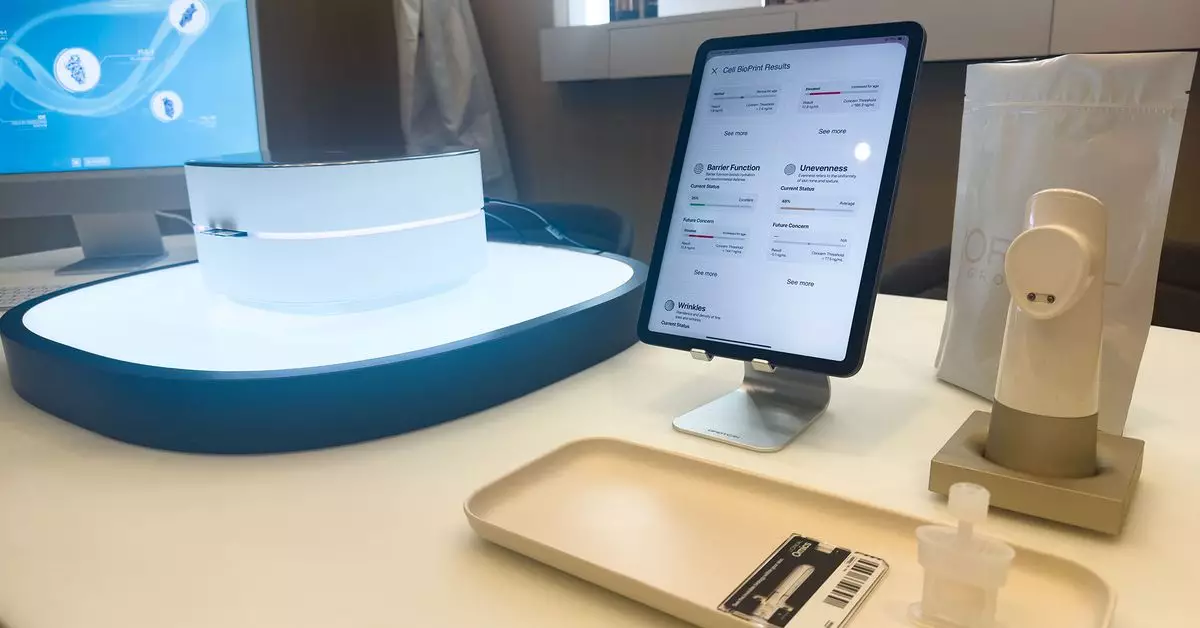In the fast-paced world of health technology and beauty products, the search for the perfect skincare regimen often feels like an uphill battle. Amid the barrage of misleading advertisements and unsubstantiated beauty claims, consumers are left wondering which products to trust. However, L’Oréal is stepping into the fray with innovative technology designed to offer personalized skincare solutions: the Cell BioPrint. This intriguing gadget represents a significant shift in how we can approach our skincare routines, promising a customized experience that uses scientific data to tailor solutions tailored to individual needs.
Having experienced the arduous environment of Las Vegas, where toasty temperatures and arid air left my skin parched and flaky, I found myself yearning for a product that could help me understand my skin better. The Cell BioPrint serves as a luminous beacon of hope for those of us who’ve been misled by countless skincare fads. After all, most of us have tried layers of serums and creams without achieving the desired glow. This is where the Cell BioPrint seeks to make its mark.
L’Oréal’s latest innovation operates like a mini-laboratory, analyzing skin samples to deliver an in-depth assessment of one’s skin condition. The process is remarkably straightforward; during the demonstration, a L’Oréal expert gently collected samples from my cheeks using specialized stickers. The collected samples underwent a series of evaluations, including imaging scans and demographic inquiries, transforming the data into actionable insights regarding my skin’s health.
Using cutting-edge proteomic research, the Cell BioPrint evaluates various aspects of the skin, such as oiliness, wrinkles, pore size, and skin barrier function. Upon finishing the assessment, I found the results enlightening. Not only did they offer a clear picture of my skin’s current state, but they also predicted potential future issues—a crucial factor when planning a long-term skincare strategy.
At the heart of the Cell BioPrint lies extensive scientific inquiry. As Guive Balooch, the global vice president of L’Oréal’s Technology Incubator, elaborated, the development of this device involved an intricate study of 800 biologists across various fields who examined the proteins expressed in skin cells.
Balooch explained that the company meticulously tested over 4,000 people across continents to identify key proteins that influence skin health. This painstaking process allowed them to narrow down thousands of proteins to just a handful of biomarkers that deliver crucial insights. The complexity of identifying actionable proteins is comparable to locating a few needles in a vast haystack.
The promise of personalized skin assessments through such a scientific foundation is a game-changer. The Cell BioPrint isn’t just a nifty gadget; it’s an emblem of advancement in understanding how our skin reacts to our lifestyles and genetics.
A significant advantage of the Cell BioPrint is the personalized guidance it offers, allowing users to trim the excess from their skincare routines. Armed with the knowledge of what works for your skin, you can make informed decisions about which products to incorporate or eliminate. For instance, I learned that I could safely skip the plethora of pore-minimizing products that the market hails as must-haves.
This focus on efficiency and tailored recommendations stands in stark contrast to the prevailing culture of overconsumption fueled by influencers and marketing ploys. As someone who has fallen for the trend of using elaborate ten-step skincare routines, I found reassurance in a device that advocates for less rather than more.
Yet, skepticism remains, particularly given the industry’s notorious history of overselling products under the guise of scientific validation. While Balooch insists that Cell BioPrint is about enabling consumers to make smarter choices rather than pushing more products, it raises questions about the integrity of promotional claims in the beauty market.
Trusting a brand’s assertions necessitates extensive messaging transparency and scientific backing. The Cell BioPrint, with its roots in proteomics, provides an appealing layer of legitimacy. While it undoubtedly aims to facilitate informed choices, one must remain vigilant against the ever-looming specter of marketing hyperbole.
As we forge ahead in this digital age, the role of technology in personal care will only grow more significant. L’Oréal’s Cell BioPrint not only reflects a novel approach to skincare but also sets a precedent for the broader market. By harnessing scientific inquiry and technology, L’Oréal is taking a stand against misleading beauty regimes, offering consumers the power to differentiate fact from fiction in a sea of flashy advertisements.
The insights gathered through the Cell BioPrint offer a unique opportunity for those seeking a balance between self-care and informed decisions. With the precise knowledge of what our skin truly needs, we can invest in our beauty routines wisely rather than impulsively. It’s time to embrace a skincare future founded on authenticity and scientific discovery, and the Cell BioPrint may very well be the transformative tool to guide us there.

